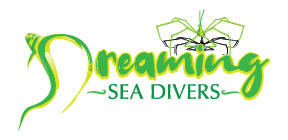
Are you looking to share your love of SCUBA and educate others? There’s no better way to do so than becoming a SCUBA instructor. Our private SCUBA instructor diving courses open the door for serious divers to turn their passion into a way of life. With the determination, practice, and proper certifications, you’ll be able to teach people about the sport you love – and get paid in the process. Join Dreaming Sea Divers for Instructor Development Courses, happening October 16th-24th, 2022!
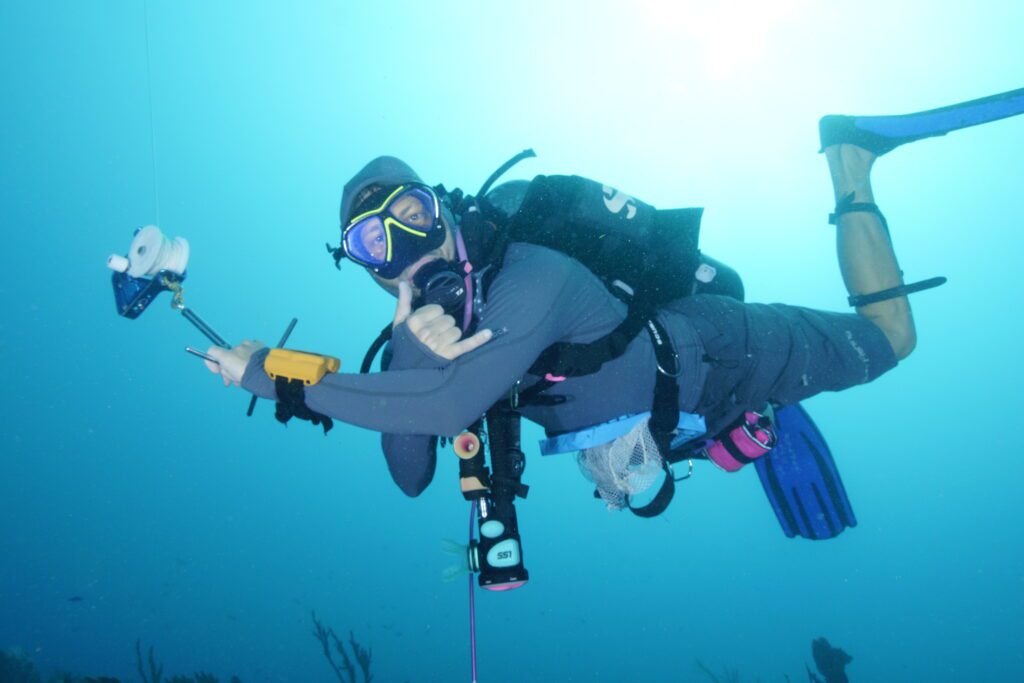
This private SCUBA certificationcourse enables participants to obtain the first level of professional diver in the SCUBA industry: Divemaster. This distinction will allow you to work in the industry to guide certified divers, assist instructors with training, and teach a select number of courses (like refreshers).
Those interested must be 18 years or older, have a minimum of 40 logged dives, and must bring their own basic SCUBA equipment. Additionally, a Rescue Diver and CPR Cert from and recognized agency is a prerequisite. Throughout the course’s instruction, participants will conduct activities like:
Please note that the Divemaster Course does not include rental gear, so come prepared! For more information, visit the course event page. We’re excited for you to partake in our West Palm Beach SCUBA instruction to become a role model and mentor to fellow divers!
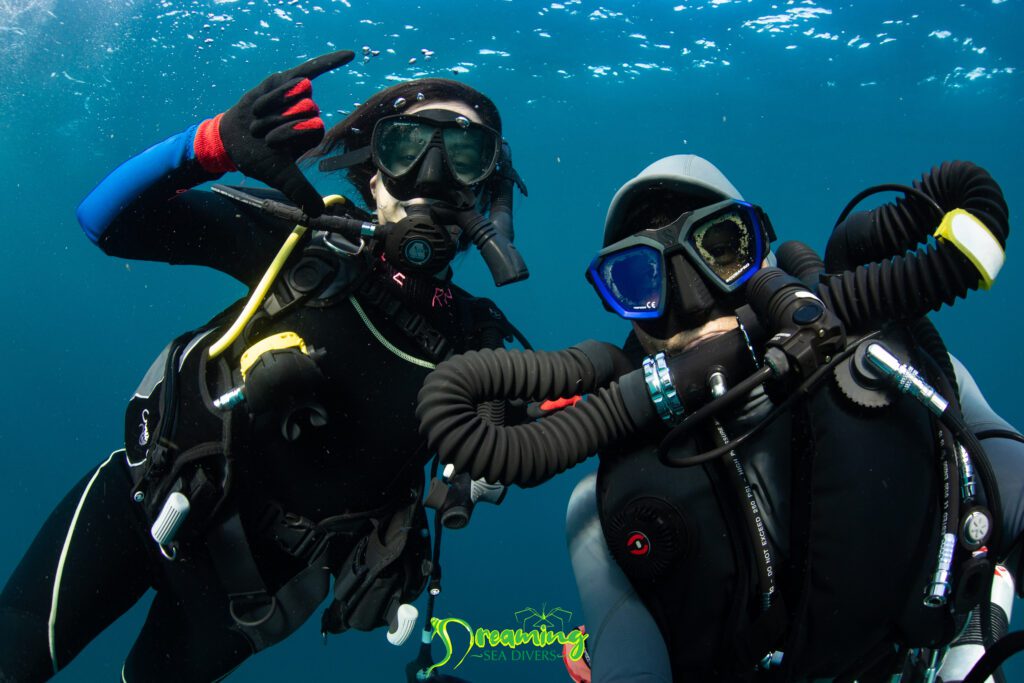
This course grants participants the knowledge to teach and certify students from Open Water up to the Divemaster level. Through the Instructor Development portion of the course, you will learn how to teach to the standards of SCUBA Diving International. Scenarios will be presented to test your aptitude in dealing with potential difficulties students may have along the way. We’ll also go over the business aspects of diving so you can be armed with the know-how to make diving a career. From there, you will be evaluated on your instruction abilities.
Those interested must be 18 years or older, have a minimum of 100 logged dives, and must bring their own SCUBA equipment. A Divemaster or Assistant Instructor and CPR Certification from a recognized agency is a prerequisite. Throughout the course’s instructional workshops, participants will learn about:
Please note that the Instructor Development Course does not include rental gear, so come prepared! It does, however, come with the Pro OWSI Kit. For more information, visit the course event page. Come learn from a renowned South Florida SCUBA diving certification instructor, and leave with the experience to start your own operation!
As an avid diver, you know that your skills and equipment can take you to places otherwise unimaginable. The best way to show the world below the surface to others is educate and get them physched about diving.
When taking one of Dreaming Sea Divers’ Instructor Development Courses, you’ll go home with the necessary skills to begin your journey as a professional dive instructor. Reach out to John and the crew to reserve a spot on our SCUBA West Palm Beach diving course roster. We’ll see you with fins on and an appetite for learning!
Ready to become a Divemaster? It’s a serious question and will often lead to other inquiries about the industry or its courses. In this blog, we’ll dive into a couple of common questions about what to expect.
As a Divemaster, you are responsible for organizing and leading recreational dives and supervising as a dive guide. You can also teach dive courses and complete scuba reviews.
Another opportunity as a Divemaster is that you are now qualified for the responsibility of overseeing scuba diving operations for salvages or work at a resort.
The Divemaster SCUBA diving lessons are typically very flexible and depending on one’s schedule, can be achieved in three weeks or up to six months. We have trained experts who will be able to provide one-on-one support during the lessons. Expect to learn more about theoretical concepts in the course ranging from the physics of diving to decompression theory and first aid.
When it comes to diving equipment, you want the best tools for the job. Must-haves like a snorkel, mask and dive computers should be at the top of your list. Some other diving equipment you may need to become a divemaster include:
The conditions when trying to achieve a SCUBA certification are some of the most challenging you’ll face. This is because divemasters want to help you flourish in any kind of water, so you can do the same to help your students.
Training typically occurs in a pool or in a confined area of water such as a very calm beach.
Make sure you know how to perform tasks like setting up gear, entering or exiting the water, basic underwater navigation techniques, safety and buoyancy control in any kind of water conditions.
In order to become a divemaster, you need to be 18 years or older, have at least forty (40) dives logged and successfully completed, a signed medical statement from your doctor within the past year before the course, and SCUBA certifications in Rescue Diver and Emergency First Responder courses.
Get ready to be tested on treading water for 15 minutes straight, swimming a distance of 400 meters and snorkeling for 800, and then tow a tired diver for 100 meters. Lastly, make sure you and a buddy know how to do a complete gear swap before obtaining your SCUBA diving certification.
Learning about theoretical dive situations and information will be a breeze if you’re motivated to participate and pass the test as well.
Time management, organization, good communication and patience are very important when it comes to becoming a good Divemaster. Overall, if you strive to be a role model as a dive professional then you will certainly inspire students and help them make progress.
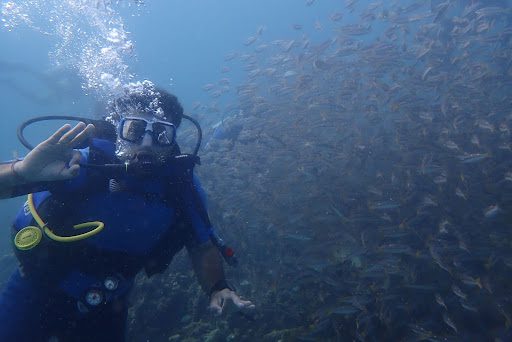
The founder and Divemaster of Dreaming Sea Divers, John Phillips, has been passionate about SCUBA diving since he first took his Open Water Course in 2014. His experience also includes working on dive boats, fill stations and retail stores, so he’s learned a lot and is ready to assist others with fulfilling their dreams of working in the diving industry. John also is excited to meet many serious divers and turn their hobby into an enriching, fulfilling career. After all, who wouldn’t want a career that blends their passions with the ability to teach and earn an income from it all?
Dreaming Sea Divers can help you achieve your diving goals for any lifestyle, so click here to learn more about our programs.
Are you interested in learning to dive but don’t know where to start? While there are a variety of certification agencies for new divers to try, most schools teach the same standardized skill when learning to dive.
Keep in mind, the similar approach used by these diving agencies may cause you to consider other factors. You may discover it is more important to focus on how comfortable you feel with your diving instructor. After that you may decide to compare other factors including price and location.
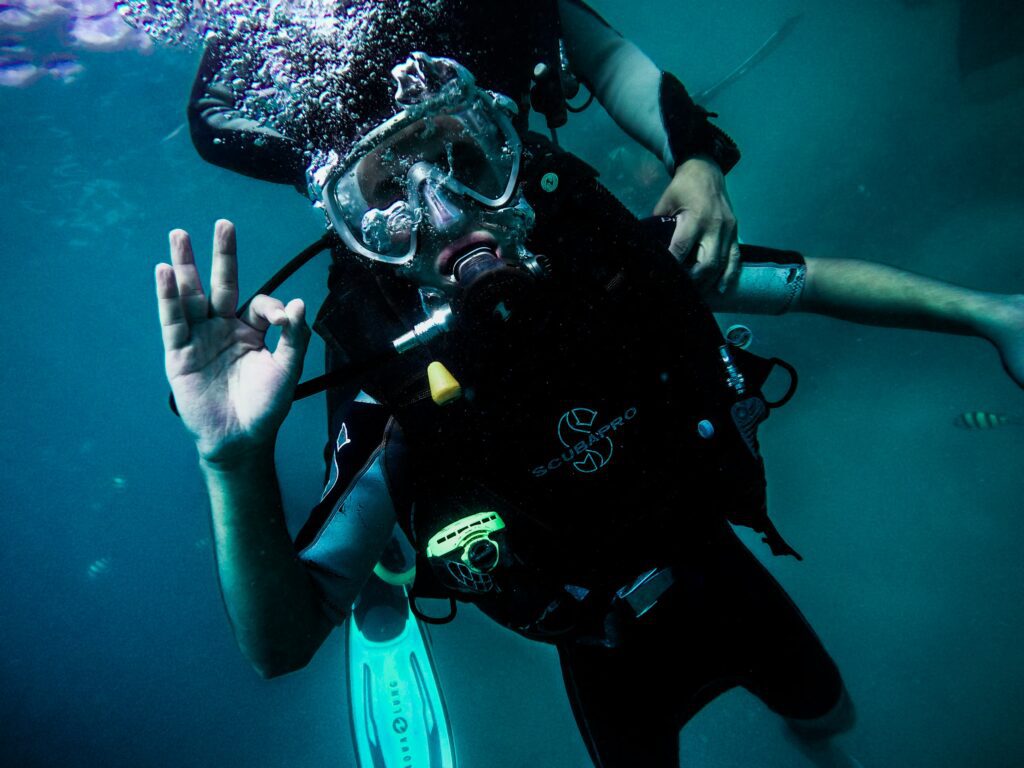
SDI was started in 1998 out of its sister company TDI. The only SCUBA certification that requires students to be taught with modern dive computers, there’s an emphasis on practical skills learned in the pool and open water.
Dreaming Sea Divers own John Phillips is a Course Director for SDI. Key points about SDI:
PADI is another diving certification agency that emphasizes the theory and practical skills of diving. Founded in 1966, PADI presently maintains over 6,000 diving schools around the world. Their extensive reach has allowed them to license over 60 percent of recreational divers with a PADI certification. PADI also gives you the option of beginning your educational experience online with courses that offer flexibility for future divers needing to grasp the basics.
4 E Philosophy
Project AWARE
Compared to other dive agencies, this organization stands out because of their environmental efforts using their non-profit organization Project AWARE. PADI works hard to organize beach cleanups, promote plastic awareness campaigns, and participate in shark protection through their marine conservation efforts. PADI believes conservation efforts are crucial to the future of diving.
NAUI was established in 1959 and currently holds the title of the oldest diving agency around. A non-profit diving organization, NAUI focuses on recreational and technical training for those learning to dive. This organization is recognized for its innovative approach when training divers and is the second-biggest agency based on the number of certifications delivered to the diving community.
Fun Fact: NAUI has trained and educated divers working for big names like Disney World Resort, the United States Navy Seal Teams and NASA’s Neutral Buoyancy Laboratory in Huston, Texas.
SSI was established in the 1970s and uses professional dive centers and resorts to attract future divers. This diving school is a retail-based organization, so they mostly attract tourists interested in freediving, snorkeling, swimming or scuba diving. SSI has 30 service centers that use uncompromising standards and focused methodology when teaching you how to dive.
Scuba Diving Diamond
This organization promotes the scuba diving diamond focused on four main points. These include:
There isn’t necessarily an agency that offers a “better” approach when certifying new divers. Diving organizations have more similarities than differences and follow the same global standards. Each diving agency teaches the core skills necessary to learn to dive.
Furthermore, all students receive the same certification capabilities around the world. The likeness of each agency means new divers should focus on the experience provided by their dive instructors. Who you learn to dive from is one of the most important factors to consider. Your diving instructor is the captain of your adventure. His energy can affect your experience, especially if the class size is too big or the instructor does not meet your needs. John Phillips offers a diving experience that puts safety first – so you can focus on enjoying exploring the wonders of the ocean.
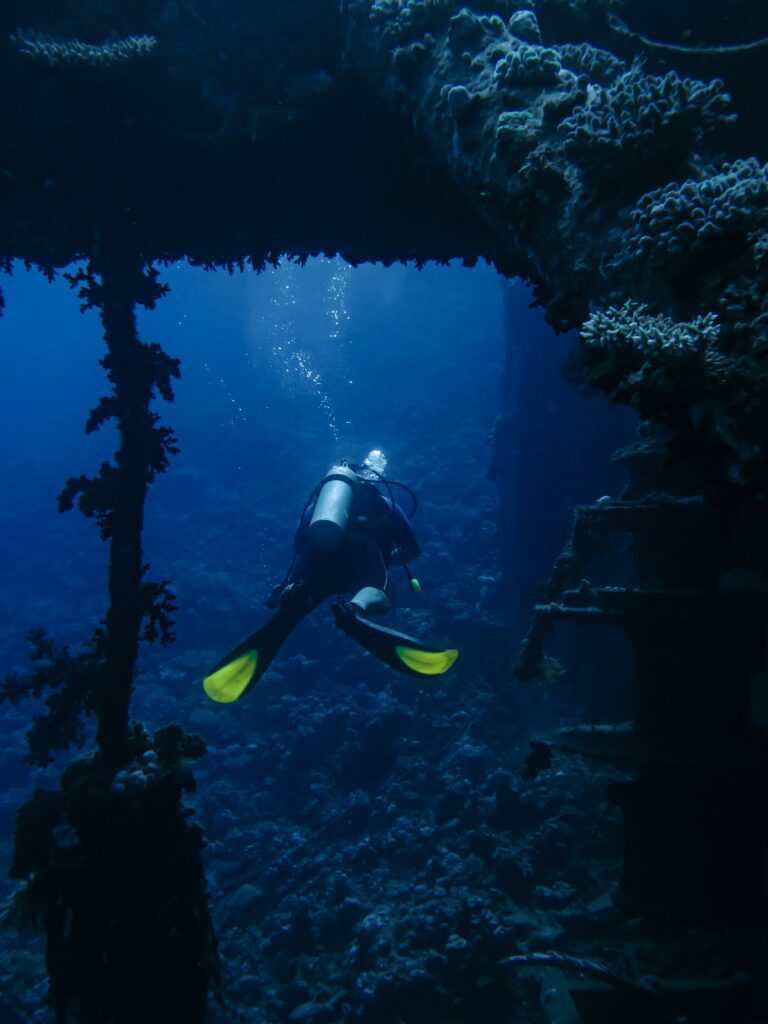
Dreaming Sea Divers gives you a chance to do something different this Valentine's Day. Connect on a deeper level by learning to dive with your significant other. Explore the mysticism of the underwater world and find a new hobby for you both to take up this New Year.
There are many benefits to hiring a private dive guide and our mission is to make your day of diving a magical experience! Book your next adventure with us here.
Every day, thousands of people make the decision to take up scuba diving. If you are one of them, congratulations! Diving opens a lifestyle of adventure and new experiences unlike anything in our terrestrial world. You’ll feel weightlessness and interact with marine life of all shapes and sizes. Diving is exciting to be sure, but if you haven’t yet taken the plunge, you probably have questions and might even be a little apprehensive. To help make your transition from land to sea a little more comfortable, let’s explore what it’s like to “get certified.”
Open Water Diver is the introduction certification level that allows divers to dive independently—meaning not under the direct supervision of a qualified, active status diving instructor. Generally speaking, being “certified” means having successfully completed this level of diver training.
Open Water divers are certified to a depth of 60’ in saltwater and in conditions similar to those you were trained in.
You might be surprised to learn there are dozens—maybe hundreds—of certification levels including advanced diving options and countless specialty certifications like wreck diving and underwater photography.
After Open Water, Advanced Diver training is the typical next step. As an Advanced Open Water Diver, you’ll be introduced to more diving experiences including underwater navigation and the opportunity to explore depths to 100 feet.
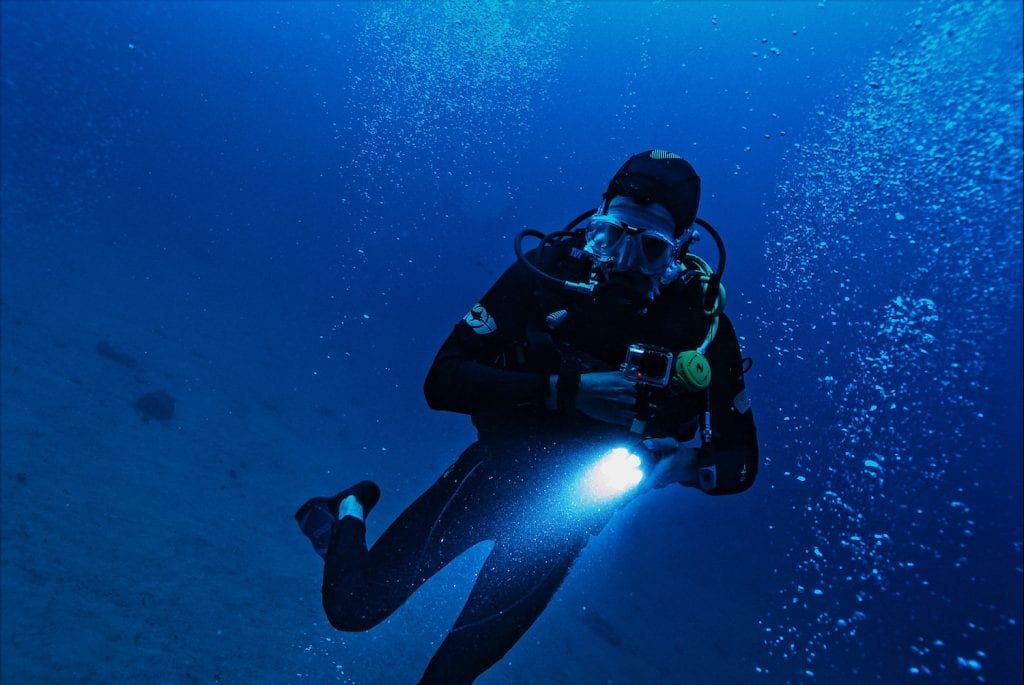
While it is great to learn about future training options, you probably have questions about what your Open Water Diver Course will be like. Common questions among future Open Water Diver students are: Do I have to take my mask off? Do you need to be able to swim to scuba dive? Is it expensive?
Of course, there are countless questions would-be divers ask, but let’s examine these a bit. To begin, mask skills, i.e. removing and replacing your mask are important to scuba diving. A lot of divers fear removing their masks but are surprised to learn it is an easy skill to master.
First off, removing your mask underwater is the same sensation as ordinary swimming without a mask. It’s just water on your face. Something about breathing from a scuba regulator makes it seem more serious, but it really isn’t.
Even the slightest amount of exhalation pressure through your nose will keep you from sucking in water, so water up your nose isn’t a problem after minimal practice. For most divers, it’s never a problem. You can breathe normally without your mask. The weirdest part is that, while SCUBA diving, we only breathe in through our mouth which takes a minute or two to get used to. Once you have that down, clearing and even removing and then swimming without a mask on with the gear is simple.
Clearing your mask simply requires exhaling through your nose while you gradually tilt your head upward. Some masks hold so little water that even the head tilt isn’t necessary. Like most diving skills, you’ll quickly find just the right combination tilt and exhalation volume to clear your mask nearly instantly. Some students don’t believe that adding air to a mask will replace the water inside but it works!
The important message here is, don’t freak out about taking your mask off! It’s no big deal. Promise!
You will need to pass a simple proficiency test, which includes swimming 200 yards freestyle OR 300 yards with your mask, snorkel, and fins. To clarify, “freestyle” in this case means swim that distance pretty much any way you can without the aid of supplemental floatation. In other words, no blow-up ducky or water wings will be allowed.
Some divers choose the mask, snorkel & fins option and just do laps at a manageable pace. The exact number of laps depends on the pool you train in. In any case, it isn’t too much of a challenge for most people. If you set a world record lap time, your instructor won’t be able to verify it to the powers that be, so just go slow!
In addition to the swim, you’ll also be asked to tread water for 10 minutes. The “tread” is another frequent panic point, but seriously, you’ll only be treading water for ten minutes. You’d do it without a second thought if it weren’t a class.
In any case, that’s it for the swimming assessments. Not so hard, right? You don’t need to be able to swim, just snorkel and tread water.
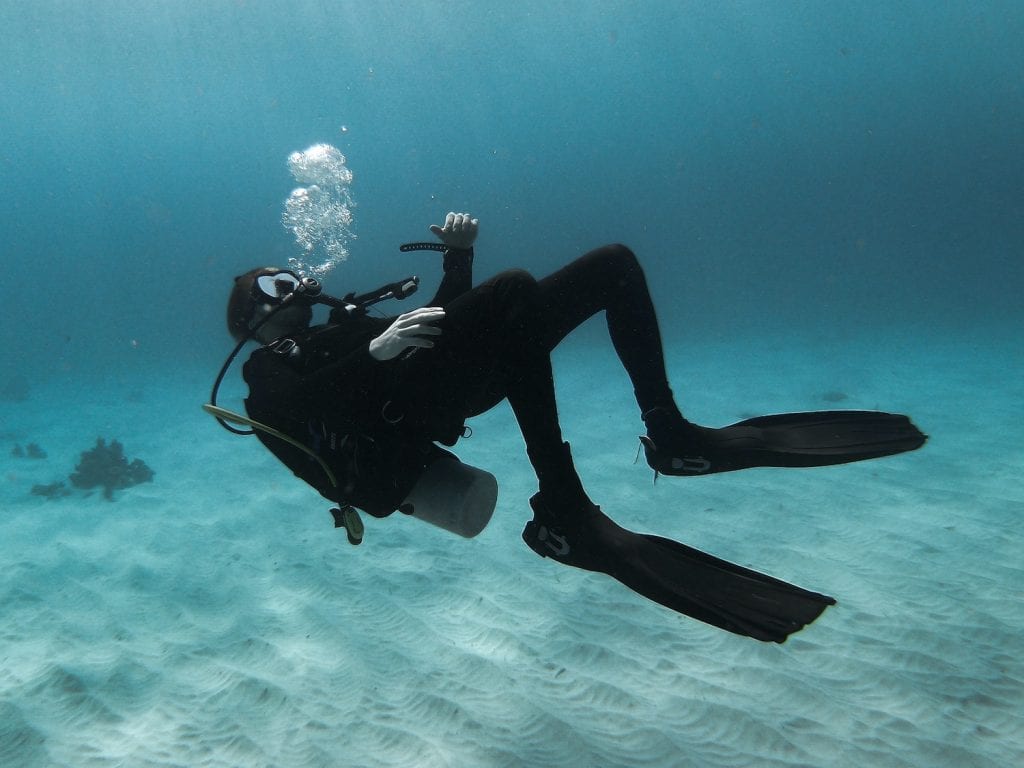
Learning to scuba dive requires access to gear and a minimum level of training (Open Water Scuba Certification). Expensive is a subjective term, but for most who wish to learn to dive, the cost isn’t difficult to manage. Diving equipment can be rented and budget-minded divers often purchase one piece of gear at a time.
In most locations, diving instruction isn’t overly costly. Open Water Scuba Diver is a thorough course that you’ll only take once, so make sure you are comfortable with your instructor. Saving a few pennies in exchange for a miserable experience isn’t worth it.
In most cases, the “resort courses” you find in popular tourist locales are rushed and taught to the maximum ratios of student to instructor. These are typically more expensive than you’ll find where you live as well. If you are planning your first diving vacation, we recommend you learn to dive locally even if you’ll be renting gear onsite. You’ll enjoy better training and spend your days diving rather than in a class.
People new to diving often worry about mask and regulator skills, fixating on the things they fear. Don’t. You’ll find that it just takes a little practice to easily master them.
Diving is a community. You’ll be welcomed into our diving lifestyle with open arms. During your open water course, you’ll likely make lifelong friends and change your own view of the world around you. And you’ll probably never plan a vacation quite the same way.
If you’re still not sure, call us to schedule what some call a “try dive.” Try dive isn’t the best term, however, since you’ll have an opportunity to learn some of the skills you’ll master during your Open Water Diver course.
Whether you are ready to fearlessly charge into your certification course or are apprehensive about the unknown, diving offers a lifetime of real adventures. Ask us anything and we’ll be open and honest with you about what you should expect!